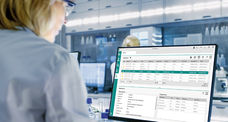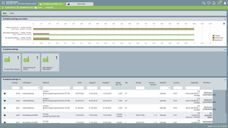From reactor design to the printed schnitzel
KIT selects the best innovations: ReacTUNE - a software tool for designing reactor geometries - wins the NEULAND Innovation Competition 2025
Advertisement
Completes months of work in under an hour: ReacTUNE, new software from the Karlsruhe Institute of Technology (KIT), automatically calculates the optimum geometry for chemical reactors and generates directly usable files for their production using the 3D metal printing process. At this year's NEULAND innovation competition, the new tool with potential for use in industry was awarded the Ideas Prize.
Process engineering reactors are an important basis for the chemical industry. Developing and producing complex reactor geometries usually takes several months and requires in-depth expertise. The software ReacTUNE - Intelligent Reactor Design Optimization, which was developed by Mertcan Kaya and Professor Christoph Klahn from the Institute of Micro Process Engineering at KIT, now reduces the design effort to 45 minutes. "Even with little design knowledge, complex devices can be developed quickly and efficiently," says Klahn. "Users simply define their requirements and ReacTUNE calculates the optimum reactor geometry on this basis. The result is an industry-standard 3D print file that only needs to be executed using the appropriate production machines." This is made possible by linking computer-aided design and numerical simulation. The researchers have already successfully implemented the software in methanol synthesis and validated it on a laboratory scale under real process conditions. The scientists are currently expanding the software for broader application and are planning a spin-off.
The best application-oriented ideas from the KIT
In addition to ReacTUNE, KIT honored two other high-potential projects in the NEULAND innovation competition. Second place went to the Hybrid Extrusion Printing project and the team of Markus Fischer, Dr. Nico Leister and Laurids Pernice from the Institute of Bio- and Food Process Engineering at KIT. They have developed a method for producing meat substitute products with meat-like structures. This combines industrial extrusion - in which material is forced through a mold under pressure - with the precision of 3D printing. The process is particularly suitable for whole-cut products such as plant-based steak or schnitzel, i.e. products that consist of a single piece.
The CeraMMAM (Ceramic Multi-Material Additive Manufacturing) project by Professor Frederik Zanger and his team from the wbk Institute of Production Engineering at KIT also received an award. They have developed a binder system for the additive manufacturing of multi-material ceramics. The system enables maximum precision and could therefore soon open up new fields of application for ceramic materials in medicine, mechanical engineering and aerospace.
Transfer prize for tritium analysis
The KIT also awarded the Technology Transfer Prize. This was awarded to the project Micro-Raman system for the detection of hydrogen isotopologues - i.e. chemical variants of hydrogen with different masses - by Dr. Robin Größle from the Institute for Astroparticle Physics at KIT and his team. Together with the industrial partner smolsys ltd. from Switzerland, they further developed an analysis device for fusion research. In future, it will be used for tritium monitoring in fusion power plants and for heavy water analysis.
About the NEULAND innovation competition
Every year, KIT invites its researchers and doctoral students to submit their application-oriented projects to the NEULAND innovation competition. In addition to cash prizes with a total value of 19,000 euros, the winning teams receive targeted support from KIT's innovation management team in transferring their ideas to industry and society.
Note: This article has been translated using a computer system without human intervention. LUMITOS offers these automatic translations to present a wider range of current news. Since this article has been translated with automatic translation, it is possible that it contains errors in vocabulary, syntax or grammar. The original article in German can be found here.
Other news from the department science
These products might interest you
Most read news
More news from our other portals
Something is happening in the chemical industry ...
This is what true pioneering spirit looks like: Plenty of innovative start-ups are bringing fresh ideas, lifeblood and entrepreneurial spirit to change tomorrow's world for the better. Immerse yourself in the world of these young companies and take the opportunity to get in touch with the founders.




































































